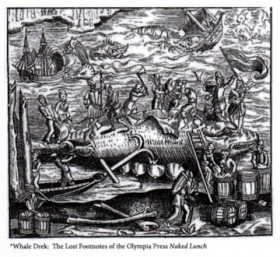 In an unsigned Publisher’s Note to Whale Drek: The Lost Footnotes of the Olympia Press Naked Lunch, Jed Birmingham writes: “Planned Obsolescence Press specializes in distributing small shiploads of K.Y. made of genuine whale drek. What better to grease the lines of communication? The Press recycles that which no one has found any use for. The lost, the forgotten, scraps from the dustbin. In short, footnotes to literary history.”
In an unsigned Publisher’s Note to Whale Drek: The Lost Footnotes of the Olympia Press Naked Lunch, Jed Birmingham writes: “Planned Obsolescence Press specializes in distributing small shiploads of K.Y. made of genuine whale drek. What better to grease the lines of communication? The Press recycles that which no one has found any use for. The lost, the forgotten, scraps from the dustbin. In short, footnotes to literary history.”
Contrary to Big Data, Birmingham’s data is produced cheaply and primitively. The typed pages sometimes accompanied by illustrations are photocopied and stapled together more or less like the mimeo magazines of the ’60s, which Birmingham has collected and written about with obsessive fascination over the past several years. In addition to Whale Drek, he has leaked two other titles to date: The Collected Kulchur Book Reviews of TED BERRIGAN and The Selected Critical Writings of Douglas Blazek from OLE. Obviously, they are intended not just for literary types but for literary types of a special kind.
!['The Collected Kulchur Book Reviews of Ted Berigan' [Planned Obsolescence Press, 2013]Published and edited by Jed Birmingham](http://www.artsjournal.com/herman/wp/wp-content/uploads/2013/06/KULTURE-TED-BERRIGAN280.jpg)
The Collected Kulchur Book Reviews of Ted Berigan [Planned Obsolescence Press, 2013]
Published and edited by Jed Birmingham
The samizdat nature of Birmingham’s literary project bears a more striking similarity to that of another do-it-yourself dissident, Gerard Bellaart, the exemplary publisher-editor of Cold Turkey Press, who’s been turning out underground literary publications in limited editions never numbering more than 36 copies since 2006. Although there are differences in the style and content of their work, largely due to their differing personal backgrounds, talents, interests, and means of production, both publishers are unquestionably kindred spirits,
Birmingham, an American based in Baltimore, is a maverick writer-critic with a penetrating mentality for textual analysis and a connoisseur’s knowledge of book collecting. For economic reasons and also as a matter of principle, he takes a perverse pride in his no-frills photocopying. Bellaart, a Dutchman based in a small French village near Bordeaux, is a nonconformist artist-poet with a deeply discriminating aesthetic sensibility and an encyclopedic knowledge of art and art history. He prints beautifully designed pamphlets, cards, and posters on quality paper either on his own small inkjet press or has them printed with a friend’s help at a local print shop on whatever paper is available. Like Birmingham, however, he makes no fuss about it and produces leaks at lightning speed. Not to put too fine a point on it, I have no doubt Bellaart would be in complete agreement with Birmingham’s statement of purpose.

![From 'The Collected Kulchur Book Reviews of TED BERRIGAN' [Planned Obsolescence Press, 2013]](http://www.artsjournal.com/herman/wp/wp-content/uploads/2013/06/publishers-note.jpg)